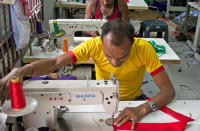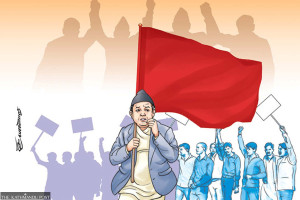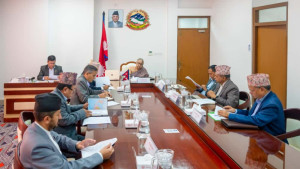Columns
Trump’s Middle East pivot
Trump’s agreements reflect Washington’s attempt to draw countries in the Middle East away from China’s orbit.
Maria Papageorgiou
The US president, Donald Trump, claimed he was able to secure deals totalling more than $2 trillion (£1.5 trillion) for the US on his tour of the Gulf states in May. Trump said “there has never been anything like” the amount of jobs and money these agreements will bring to the United States.
However, providing a lift for the US economy wasn’t the only thing on Trump’s mind. China’s influence in the wider Middle East region is growing fast—so much so that it was even able to mediate a detente between bitter regional rivals Saudi Arabia and Iran in 2023.
Trump’s attempt to strengthen ties with countries in the Middle East is probably also a deliberate attempt to contain China’s growing regional ambitions.
China has spent the past two decades building up its economic and political relations with the Middle East. In 2020, it replaced the EU as the largest trading partner to the Gulf Cooperation Council, which includes Bahrain, Kuwait, Oman, Qatar, Saudi Arabia and the United Arab Emirates (UAE). Bilateral trade between them was valued at over $161 billion (£119 billion).
The Middle East has also become an important partner to China’s sprawling Belt and Road Initiative (BRI). Massive infrastructure projects in the region, such as high-speed railway lines in Saudi Arabia, have provided lucrative opportunities for Chinese companies.
The total value of Chinese construction and investment deals in the Middle East reached $39 billion in 2024, the most of any region in the world. That year, the three countries with the highest volume of BRI-related construction contracts and investment were all in the Middle East: Saudi Arabia, Iraq and the UAE.
China has also strengthened its financial cooperation with Middle Eastern countries, particularly the UAE and Saudi Arabia. As part of China’s efforts to reduce global reliance on the US dollar for trade, it has arranged cross-border trade settlements, currency swap agreements, and is engaging in digital currency collaboration initiatives with these countries.
American security guarantees have historically fostered an alignment between the Gulf states and the west. The string of agreements Trump signed with countries there reflects an attempt to draw them away from China and back towards Washington’s orbit.
Countering China
One of the more significant developments from Trump’s trip was an agreement to deepen US technological cooperation with the UAE, Saudi Arabia and Qatar. The US and UAE announced they would work together to construct the largest AI data centre outside of the US in Abu Dhabi.
Technology is one of the key areas where China has been trying to assert its influence in the region. Through Beijing’s so-called “Digital Silk Road” initiative, which aims to develop a global digital ecosystem with China at its centre, Chinese firms have secured deals with Middle Eastern countries to provide 5G mobile network technology.
Chinese tech giants Huawei and Alibaba are also in the process of signing partnerships with telecommunications providers in the region for collaboration and research in cloud computing. These companies have gained traction by aligning closely with national government priorities, such as Saudi Arabia’s initiative to diversify its economy through tech development.
American companies, including Amazon, Microsoft and Google, have spent years building regional tech ecosystems across the Gulf. Trump is looking to recover this momentum. He was joined in the Middle East by more than 30 leaders of top American companies, who also secured commercial deals with their peers from the Gulf.
US quantum computing company Quantinuum and Qatari investment firm Al Rabban Capital finalised a joint venture worth up to $1 billion. The agreement will see investment in quantum technologies and workforce development in the US and Qatar.
There are two other areas where Trump is trying to cut China off. American companies and Abu Dhabi’s state-run oil firm agreed a $60 billion energy partnership. China is heavily dependent on the Middle East for energy, with almost half of the oil it uses coming from the region. Greater alignment with the US could hamper Beijing’s ability to secure the resources it needs.
Trump also signed a raft of defence deals with Qatar and Saudi Arabia. These included a $1 billion deal for Qatar to acquire drone defence technology from American aerospace conglomerate Raytheon RTX, and a $142 billion agreement for the Saudis to buy military equipment from US firms.
These moves underscore Washington’s intention to limit China’s influence in key defence sectors. China is a key player in the global market for commercial and military drones, providing Saudi Arabia and the UAE with a large share of their combat drones.
One final aspect of Trump’s trip was his brief meeting with Syria’s interim president Ahmed al-Sharaa. Trump signalled possible sanctions relief, which has since come into effect. This constituted more than a diplomatic thaw.
With China positioning itself as a regional mediator and Russia struggling with a diminished role following the fall of Bashar al-Assad in Syria, the US is looking to reassert itself as the primary power broker in the region.
—The Conversation
Find the original article here.




 18.12°C Kathmandu
18.12°C Kathmandu















